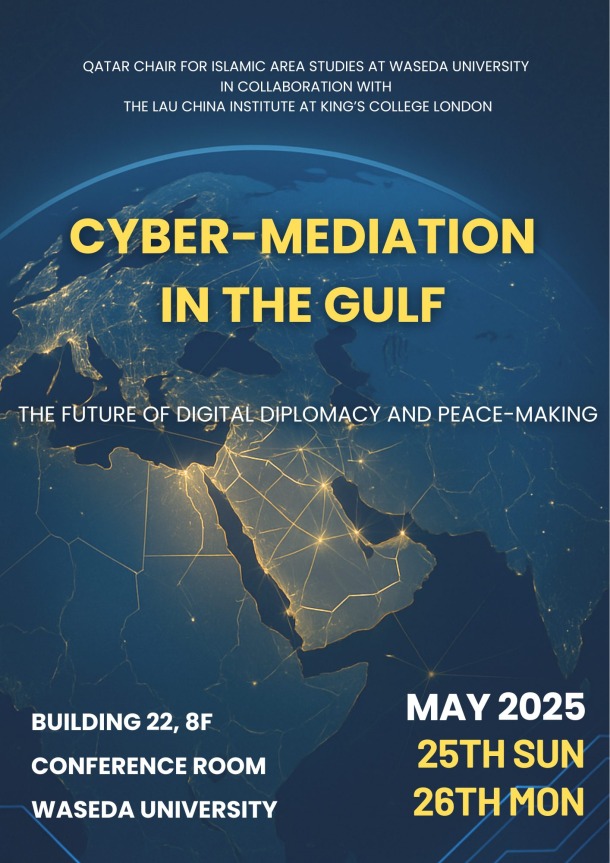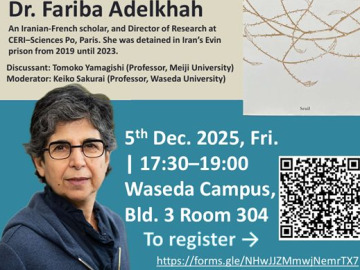Qatar Chair for Islamic Area Studies at Waseda University in collaboration with the Lau China Institute at King’s College London
Cyber-Mediation Linking the Gulf and Asia: The Future of Digital Diplomacy and Peace-making
The digital age has ushered in profound changes in how states and organizations conduct diplomacy, mediate conflicts, and interact with stakeholders. As sovereignty and strategic autonomy are increasingly shaped by digital tools and technologies, understanding their impact on mediation practices has become essential. The workshop is set to explore the role of new information and communication technologies (ICTs) in mediation, highlighting their benefits, challenges, and risks in peacemaking. It also emphasizes the need for collaboration between mediation practitioners and the tech sector, focusing on four thematic areas: trust-building in cyber-mediation, the role of digital data, the integration of artificial intelligence (AI), and the broader implications of digital diplomacy and State led cyber-deterrence.
The COVID-19 pandemic dramatically accelerated the adoption of digital technologies in mediation. Global lockdowns and travel restrictions forced mediators and support actors to rely heavily on digital tools to maintain communication with conflict parties and stakeholders. This shift underscored both the potential and limitations of cybermediation. While these technologies enabled continued dialogue despite physical barriers, they also raised critical issues around trust, data security, and accessibility.
Drawing from interdisciplinary perspectives, the workshop plans to discuss how digital tools can enhance or hinder trust among conflict parties. This conversation highlighted the urgent need to address the ethical and practical challenges of using ICTs in mediation processes accelerated digital rise leading best practices in the field from Japan and Europe to the Gulf.
Day 1
09:00 am Keynote speech Prof Abdullah Baabood, Japan and the Gulf Cooperation Outlook
09:15 am Panel I The Evolution of Digital Diplomacy from Tokyo to Doha
Keynote Speech Prof Kerry Brown: Global Implications of the China-US Competition for Chip (ZOOM Time TBC)
Chair: Alessandro Arduino
Discussants: Alia Brahimi, Rogier Creamer
- Johanna Poutanen CMI Foundation: Digital Peacemaking Trends and Best Practices
- Vincent Bernard, Geneva Graduate Institute: IHL and Cyber war
- Sorcha MacLeod, Copenhagen University: Cyber-Mercenaries
- Shuji Hosaka: Use of Internet and AI by extremist and criminal organisations
11:15 am Coffee Break
11:30 am Panel 1 Discussion.
12:30 pm Lunch
Panel II The race for AI and Big Data: Beijing – Washington competition impact in the Gulf
In the Gulf, economic and high-tech development is progressively relying on Made in China technologies. Washington’s call to remove all civilian and military networks from Beijing’s digital embrace resonates in the Middle East but is progressively losing steam, while in the ASEAN, the echo is not lost. Contrary to the ageing population in countries like Japan, in the Gulf, a young and digitally savvy population is eager to receive cutting-edge technology. Also, from a security standpoint, the Gulf monarchies are eager to acquire Chinese cybersecurity technologies, from AI facial recognition to Big Data analytics.
02:00 pm Panel 2 Chair Sorcha MacLeod
Discussants: Vincent Bernard, Shuji Hosaka
- Mirdef Alqashoti, Non-resident Fellow Middle East Council on Global Affairs: The AI ethics in mediation from Qatar to Finland
- Eric Alter, Anwar Gargash Diplomatic Academy: The Evolution of Diplomacy in the Gulf
- Rumi Aoyama, Waseda University: China’s Beidou Project, regional and global implications
- Alessandro Arduino KCL Lau Institute: The evolution of Cybersecurity in the Gulf: A Chinese or US model?
04:00 pm Panel 2 Discussion.
05:00 pm Wrap Up day 1
06:00 pm Reception (Invite Only)
Day 2
09:00 am Keynote Speech Prof. Gianmaria Ajani: AI and Digital Sovereignty – comparing the PR of China and the US models (ZOOM Time TBC)
Doha, Riyadh, and Dubai are looking at Beijing’s one-stop shop as a way to become regional leaders in the development of blockchain technologies and central bank digital currencies. In both cases, technology transfers via the digital Silk Road are a core component of China’s internationalisation of its visions and values in cyberspace, which include a state-centric approach to digital governance. While full digital decoupling is not on the horizon, the increasing influence of Chinese standards and technologies is a cornerstone of Beijing’s cyber sovereignty strategy, in place of the Western open-internet model
09:15 am Panel 3 Chair Mirdef Alqashoti
Discussants: Eric Alter, Johanna Poutanen
- Kazuto Matsuda, Non-resident Fellow at the Middle East Council on Global Affairs: The place of cyber diplomacy in Japan’s foreign policymaking and its implications for Japan-GCC states relations
- Andrea Ghiselli, Exeter University: China and Japan in the Gulf. A collision course? (ZOOM)
- Rogier Creamer, Leiden University: Digital Silk Road? China’s growing global digital presence in diplomacy and security
- Alia Brahimi, Atlantic Council: AI, security and international relations in the Middle East
11:15 am Coffee Break
11:30 am Panel 3 Discussion
12:30 End conference and wrap up






